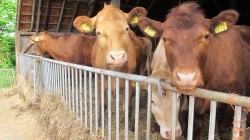Short food supply chain: unity makes strength
"Why do you talk about short supply chains? You promote small and uncompetitive farms that cater to the richest consumers." In 2012 the former EU commissioner for Agriculture, Dacian Cioloş, said he often received this objection. Over the last years, short food supply chains have gained ground in Europe. Selling directly has been seen by farmers as an exit strategy to withstand the crisis of the agriculture sector, while allowing people to buy local and healthier produce. This is all the more true in countries hit by major food scandals, such as the Netherlands, where the government officially admitted that "these incidents have undermined public confidence in the food industry." Jan van den Broek is a Dutch organic farmer from Hilvarenbeek, who sells Angus and Blond d'Aquitaine meat, and vegetables. He started his activity in 1987. "After 27 years, my family and I decided to supply everything directly to consumers in our farm shop. As a result, we improved the profit margins in our wallet. And now we can share our story better,” he says. "Many people want to know what the biologically certified system entails. What I tell my customers is that my livestock is not being reared, literally. They can graze in nature reserves. The calves drink with their mothers and stay with them all summer, and thus have enough time to grow. That's why they naturally get a greater resistance and better health, and there’s no need for antibiotics. This means tastier meat. It's the same with vegetables. If you grow them very aggressively with artificial fertilisers, you also have less tasty products." One of the challenges of short supply chains is that single producers have a limited offer. And people don't want to clock up kilometres shopping around from different farmers. That's why Van den Broek sells organic products from other colleagues as well, such as cheese, bakeries and beer. This is a common solution for farms that have switched to short supply chains. Networking is crucial. Corné van Roessel, a farmer from the same region, holds 150 bulls in Goirle. He also owns 30 ha of corn, grass, grain - to feed his animals - and potatoes. "We have a number of partner companies. For example, we purchase pigs and chickens directly from farmers and poulterers and pick up vegetables from a vegetable grower of the region in order to offer a complete range in our shop," he says. He serves 600 to 800 customers a week. E-commerce is also possible through their internet platform. Additionally, van Roessel delivers meat to restaurants (mostly through a wholesaler of regional products) and other farm shops. Ten years ago they owned 200 bulls and 200 goats, and sold to the grocery with low or negative profit margins. Now, even with fewer animals and extra costs for delivering and picking up products, he makes enough money for a sustainable business. "Now that I do everything all by myself, there is work for about six full-time employees. We have a turnover of over one million euros of which 60% shop and 40% wholesale. A small price increase has no effect, but offers more possibilities." Van Roessel underlines the freshness of his products. "Every Thursday an animal goes to the slaughterhouse. On Friday we can pick it up again and it's cut up on Monday afternoon by our butchers. We then let our meat lie for two to three weeks, in a kind of maturing phase, to get it more tender, nicer and tastier. Because we sell so much, we can determine when to offer a product to our customers." Read more: http://www.shortfoodchain.eu/news/articles/short-food-supply-chain-unity-makes-strength.kl(opens in new window)
Keywords
Countries
Belgium, Netherlands



